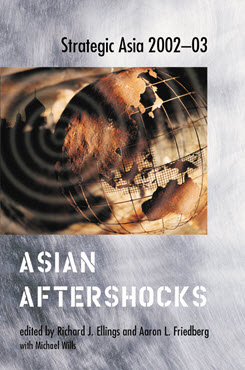China (Strategic Asia 2002-03)
This chapter reviews the major motivations behind China’s security strategy. It discusses why China initially responded moderately and cooperatively after September 11 to the U.S. war on terror, even as it became clear that the war effort carried implications for U.S. foreign policy and the foreign policies of China’s neighbors that Beijing would have sharply criticized under more normal conditions.
September 11 provided a significant opportunity for the reduction of tensions and an increase in cooperation between the People’s Republic of China (PRC) and the United States. The nature and source of the attack on the United States provided the basic foundation for that cooperation. Both the PRC and the United States are threatened by militant Islamism, albeit in different ways and in different places. China also has had economic and related domestic security reasons to worry about U.S. woes following September 11, so there was no vengeful glee expressed in high circles in Beijing. On the contrary, Beijing took several steps diplomatically, financially, and in the intelligence realm to assist the U.S. counterterrorism effort. Although it would be wrong to exaggerate the importance of those steps to the campaign, the spirit behind them is quite meaningful, at least for the near term.
How long the spirit of cooperation will continue is an open question. Beijing will be quite nervous about Washington’s extension of the war to sovereign states other than Afghanistan. Moreover, the September 2001 attacks occurred at a time when Beijing was extremely confident about its long-term ability to produce desirable results in relations across the Taiwan Strait. That optimism about China’s increasing leverage over the island reduced the initial sensitivity to many regional aspects of the U.S. war on terror. Since the December legislative elections in Taiwan, in which President Chen’s traditionally pro-independence Democratic Progressive Party (DPP) fared surprisingly well, that optimism in Beijing has decreased markedly. These revived concerns will likely be magnified by the prospect of a sustained U.S. presence in Central Asia and South Asia, a more active Japanese military, President Bush’s emphasis on the U.S. defense commitment to Taiwan, and the U.S. development of missile defense programs.
As in the past, concerns over Taiwan will intensify Chinese sensitivities over broader U.S. foreign policy: in this case the details of the U.S. war on terror. On the reverse side of the equation, the war on terror will increase U.S. sensitivities over issues such as Chinese transfers of weapons and military technologies to the Middle East, the Persian Gulf, and South Asia.
This chapter will review the major motivations behind China’s security strategy. It will discuss why China initially responded moderately and cooperatively after September 11 to the U.S. war on terror, even as it became clear that the war effort carried implications for U.S. foreign policy and the foreign policies of China’s neighbors that Beijing would have sharply criticized under more normal conditions. Although many factors contributed to China’s cooperation after September 11, one important factor that has not received sufficient attention in the media and scholarly literature is Beijing elites’ extreme and arguably excessive confidence about trends in cross-Strait relations at the time of the attack. That optimism was based on economic trends across the Strait and perceived political trends in Taiwan, but has dissipated since the fall of 2001, especially since Taiwan’s December 2001 Legislative Yuan elections. Not surprisingly, the more sober attitude about Taiwan and U.S. relations with Taiwan has led to more criticism of U.S. security policy generally, including aspects of the war on terror. The concluding sections of the paper will speculate about how regional economic, military, and political trends might affect China’s security strategy in the remainder of this decade, discussing what events might derail China’s current approach to Taiwan, the United States, and the region, and what factors could continue to strengthen China’s hand.
Strategic Asia
The Strategic Asia annual edited volume incorporates assessments of economic, political, and military trends and focuses on the strategies that drive policy in the region. Learn more about Strategic Asia.


